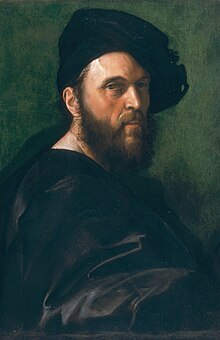
Back اندريا نافاجيرو ARZ Andrea Navagero AST Andrea Navagero Catalan Andrea Navagero German Andrea Navagero Esperanto Andrea Navagero Spanish Andrea Navagero Basque Andrea Navagero French Andrea Navagero Italian Andreas Naugerius Latin
Andrea Navagero | |
|---|---|
 Navagero in Raphael's Portrait of Andrea Navagero and Agostino Beazzano, 1516 | |
| Born | 1483 Venice, Republic of Venice |
| Died | 8 May 1529 (aged 46) Blois, France |
| Burial place | Murano, Italy |
| Alma mater | University of Padua |
| Occupations |
|
| Known for |
|
Andrea Navagero (1483 – 8 May 1529), known as Andreas Naugerius in Latin, was a Venetian diplomat and writer. Born to a wealthy family, he gained entry to the Great Council of Venice at the age of twenty, five years younger than was normal at the time. He dedicated himself to editing classical Latin manuscripts at the Aldine Press printing office, garnering a reputation as a scholar and a skilled writer. In 1515, at the request of the general Bartolomeo d'Alviano, he was appointed the caretaker of a library containing the collection of the scholar Bessarion; this library would later become the Biblioteca Marciana. At the same time, he was designated official historian of the Republic of Venice.
As a result of his high standing in Venetian scholarly circles, Navagero was named the Venetian ambassador to Spain in 1523, and navigated the volatile diplomatic climate caused by the conflict between Charles V – the Holy Roman Emperor and King of Spain – and Francis I of France. During this time, he provided many highly detailed descriptions of Spanish cities and landmarks. He was imprisoned by Charles in December 1526, but released in a prisoner exchange the following April; before returning home to Venice, he traveled to Paris to acquaint himself with the royal court of Francis.
By the time Navagero arrived back in Venice in September 1528, he had grown disillusioned with politics and wished to return to editing manuscripts and cultivating his prized gardens. Much to his dismay, he was appointed ambassador to France in January 1529. After traveling through the Alps to meet Francis I in Blois that May, he fell gravely ill and died on 8 May 1529.